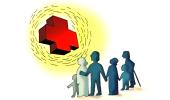Cricketer Suryakumar Yadav's surgery raises awareness about sports hernia, a painful condition that athletes tend to ignore.

Suryakumar Yadav is the latest Indian cricketer to undergo surgery for sports hernia.
While SKY's injury affected his lower right abdomen, K L Rahul underwent similar surgery in 2022 to heal from groin and abdomen pain.
Sports hernia, also known as Athletic Pubalgia Syndrome (APS), primarily affects athletes, causing chronic pain in the groin and abdomen area.
SKY's surgery has put the spotlight back on this serious health condition that affects athletes and sports professionals but is often ignored or misdiagnosed.
Dr Mohit M Kukreja, arthroscopic and sport medicine surgeon at Mumbai's Wockhardt Hospitals, explains why it is important to understand the warning signs.
Sports hernia is different from common hernia
In sports hernia, there is a tear or pulling of the soft tissue in the muscles tendons or ligaments in the lower abdomen or groin.
Unlike a common hernia, which causes a visible bulge when an organ or tissue pushes through a weak spot, in sports hernia, there is no external bump.
This simple difference makes it difficult to diagnose sports hernia in the early stages.
Considering how fit players like Suryakumar Yadav and K L Rahul had to opt for surgery, one should be aware about such injuries and get it treated on time.
Why sports hernia affects sporting professionals more than other people
Yes, it's common among sports and fitness enthusiasts who deal with sudden twists, rapid change of direction and motion or strong core movements.
Cricket is one such sport that is prone to injuries.
This type of injury is common among athletes involved in high intensity games, like football, hockey, rugby, tennis or cricket.
It usually occurs either due to repetitive and continuous stress on the lower abdominal muscles or due to instable hip adductor-abdominal muscles.
Poor core strength, wrong warm-up sessions and overtraining can make athletes vulnerable, adding to the severity of the condition.
The symptoms and warning signs
You have to be careful when there is a recurring lower abdominal or groin pain that gets worse with movement, particularly twisting, sprinting or kicking.
When you rest briefly, the pain may reduce only to return immediately when you resume the activity.
In rare cases, you may experience pain while you are coughing or sneezing.
Like I mentioned earlier, since there is no bulge on palpitation, so early signs can be easily missed or misinterpreted.
Treatment
If the person is facing ongoing groin or lower abdomen pain that doesn't get cured with rest, then you should see a doctor.
A comprehensive physical examination is necessary to identify the underlying cause and confirm the condition.
Treatments like MRI or ultrasound can help rule out other conditions and look for tissue damage.
The intervention of a specialist is recommended to avoid further groin injuries.
Surgery is not always the first step. In most situations, rest, physiotherapy and strengthening of the core can do the trick.
The aim is to minimise stress over the damaged tissue and restore muscle balance.
If pain does not respond with rehab or continues to recur, then surgery may be required to reconstruct the damaged tissue.
Each case is unique, so the treatment option also varies with the extent.

Disclaimer: All content and media herein is written and published online for informational purposes only. It is not a substitute for professional medical advice. It should not be relied on as your only source for advice.
Please always seek the guidance of your doctor or a qualified health professional with any questions you may have regarding your health or a medical condition. Do not ever disregard the advice of a medical professional, or delay in seeking it because of something you have read herein.
If you believe you may have a medical or mental health emergency, please call your doctor, go to the nearest hospital, or call emergency services or emergency helplines immediately. If you choose to rely on any information provided herein, you do so solely at your own risk.
Opinions expressed herein cannot necessarily provide advice to fit the exact specifics of the issues of the person requesting advice.










